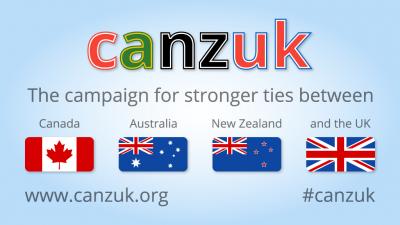The organization was created in November 2014, first as The Commonwealth Freedom of Movement Organization, by James Skinner, its executive director. According to Skinner:
“The four countries we propose are very similar in numerous ways. For example, we share the same head of state, the same language, the same Westminster-style parliamentary system, the same common-law legal system, similar economic growth rates, similar respect for human rights. What we’re advocating is not something out of the ordinary. This is something that has been done within the EU, between virtually 30 countries with a population of 500 million citizens, who have the right to live and work freely between each other, and it’s also been done between Australia and New Zealand with the Trans-Tasman Travel Arrangement … so what we’re proposing with four Commonwealth countries, who have very close Commonwealth ties, is not something completely ‘out there’.”
The group’s online petition that has garnered 225,000 signatures as of March 14. It’s promotional video has been watched more than 5,000 times. It maintains Canadian offices in Vancouver and Saint John. CANZUK International’s proposal has been endorsed by Conservative Party of Canada Leader Andrew Scheer.
The idea of a CANZUK free market with open immigration between the four countries has gained renewed attention. The intent of the administration of U.S. President Donald Trump to renegotiate the North American Free Trade Agreement (NAFTA) has raised concerns in Ottawa about the dependence of Canada’s economy on U.S. trade. Likewise, the U.K.’s imminent withdrawal from the European Union has spurred it to seek new trade agreements with other countries.
Their similarities notwithstanding, however, the four countries actually do very little trade with each other. Canada’s external trade amounted to $1.068 trillion in 2016. Seventy per cent of that, $752 billion, was with the U.S.: $341 billion in exports and $356 billion in imports. The balance was made up of capital flows from investments and activities like tourism and professional services.
By comparison, Canada’s trade with the U.K. ($25.5 billion), Australia ($3.8 billion) and New Zealand ($900 million) only totalled $30.2 billion, less than three per cent of the country’s trade (all figures are in Canadian dollars). Canada does more trade in two weeks with the U.S. than it does with the U.K., Australia and New Zealand in a year.
The U.K. is in a similar situation. Total trade in 2016 amounted to around $2.046 trillion, just slightly less than double Canada. Of that, $997 billion, or 49 per cent, was with the European Union. The amount of trade the U.K. does with Canada, Australia and New Zealand amounts to around $53 billion, or about 2.6 per cent of total U.K. trade.
Canada has long been fearful of being overly dependent on U.S. trade. Canada’s first prime minister, Sir John A. Macdonald, instituted a high tariff barrier against American goods in order to promote Canadian industry even if those tariffs reduced the prospects of U.S. trade. Pierre Trudeau’s Third Option of the 1970s was supposed to wean Canada’s economy from its reliance on U.S. markets but failed miserably in diversifying Canada’s trade. It was only with Brian Mulroney’s government in the 1980s that Canada symbolically threw in the towel on its distrust of over-dependence on U.S. trade and embraced a North American common market.
It may not be the only factor, but proximity is a significant advantage when it comes to trade. With 90 per cent of Canada’s industry and population less than 320 km from the U.S. border, the size and scope of the American economy combine to create a powerful gravitational attraction. In the same way, the 500 million inhabitants of the EU, poised 50 km across the English Channel, exert a powerful influence on British trade and industry.
The U.S. economy will loom large in Canada’s economic health regardless of whether there’s a NAFTA or how the deal may be changed. The same is true for the U.K.’s economic relations with the EU.
That doesn’t mean that a CANZUK common market doesn’t make sense. It does.
It’s unlikely, however, to be an alternative for either Canada or the U.K. to the economic behemoths on their doorsteps.
The CANZUK proposal, in one sense, feels almost like a throwback to the old British policy of Imperial Preference. Crafted during the Great Depression in the 1930s, it was an attempt to promote inter-Commonwealth trade by erecting high tariff barriers to imports from outside the association.
It didn’t work then and it wouldn’t work now. In the 1930s, Australia, New Zealand and Canada were primarily suppliers of raw materials to British industry and, in return, were major markets for British manufacturers.
Although all three countries are still major commodity exporters, their economies are very different and far more sophisticated than they were in the 1930s. Although, to be fair, CANZUK is about forging a common market for goods and people, not about creating tariff barriers.
More trade between the four countries would be good for all of them. Not because it would serve as an alternative to their current major trading partners but because, as a general rule, more trade is good for economic growth.
It’s unclear whether a common labour market would have much impact. Maybe Canadian snowbirds might flock to Queensland instead of Florida or Arizona, although those American destinations are a lot closer and more convenient.
The CANZUK proposal is worth pursuing, regardless of what happens with NAFTA. It won’t end Canada’s economic dependence on the U.S. but expanded trade with its Commonwealth partners can’t hurt.
Troy Media columnist Joseph Micallef is an historian, best-selling author and, at times, sardonic commentator on world politics.
| A Troy Media release || March 20, 2018 |||




